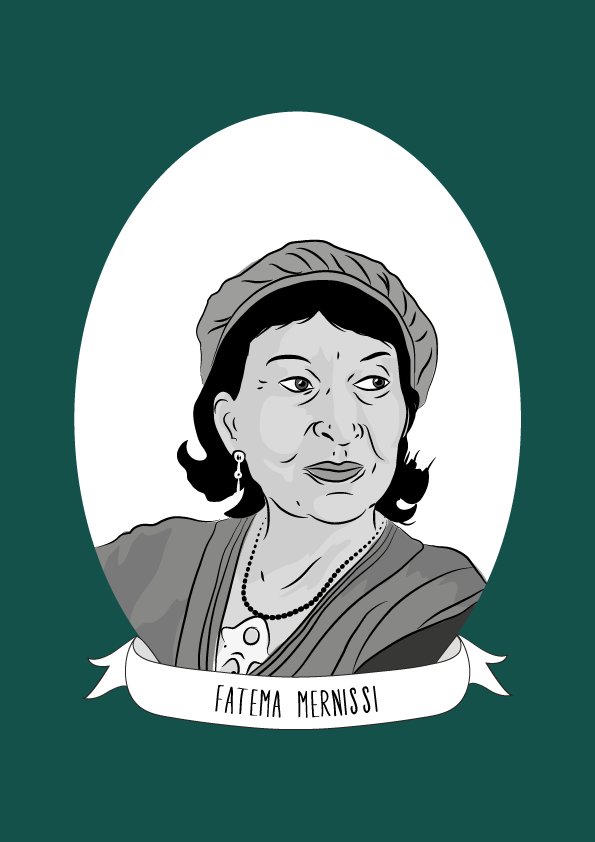Fatema Mernissi was a Moroccan sociologist and one of the founders of Islamic feminism. She is best known for her focus on reconciling traditional Islam with progressive feminism.
Mernissi was born in 1940 in Fes, Morocco. As a child, she, unlike her mother and grandmother before her, was able to gain an education. She attended a nationalist primary school, then an all-girls secondary school funded by the French protectorate During this time, she lived in the harems of her home in Fez and of her maternal grandmother’s home in the country. Life within the harem structure would later become the focus of her writing. Mernissi continued her education the Mohammed V University in Rabat, gaining a degree in Sociology before moving to Paris to study at the Sorbonne while working as a journalist.
Mernissi continued her graduate study in the U.S., enrolling at Brandeis University in Massachusetts. In 1973 she was awarded with a PhD in Sociology, with her thesis becoming her first book, Beyond the Veil: Male-Female Dynamics in Modern Muslim Society (1975). The book is her first and best known work, in which she explores the fact that the Muslim ideal of the “silent, passive, obedient woman” is nothing but a construction of the ‘ ulamā ’, the male jurists-theologians who manipulated and distorted the religious texts in order to preserve the patriarchal system, rather than having anything to do with the authentic message of Islam. She also compares Western and Islamic conceptions of sexuality and femininity in the text, which has become a classic in the fields of anthropology and sociology on women in the Arab World, the Mediterranean area or Muslim societies in general.
After graduating from Brandeis, Mernissi returned to Morocco, joining the sociology department at the Mohammed V University. She also taught at the the Faculté des Lettres between 1974 and 1981 on subjects such as methodology, family sociology and psychosociology. During the late 1970s and early 1980s, Mernissi conducted sociological research in order to map attitudes to women and work, which resulted in a book detailing selected interviews entitled ‘Doing Daily Battle: Interviews with Moroccan Women’. The book highlighted the women’s struggle against poverty, illiteracy, and sexual oppression. Her sociological research was also used by UNESCO, ILO, UNFPA (Population Fund) and the Moroccan authorities. During this time, she also contributed articles to periodicals and other publications on women in Morocco and women and Islam from a contemporary as well as from a historical perspective.
In 1987, Mernissi published The Veil and the Male Elite, first in French and later translated into other languages. The work critically examines the historical context of Muslim law and tradition and argues political leaders and religious scholars have corrupted the original message of the Prophet Muḥammad, which had called for equality between the sexes. The book also contains profiles of influential women in early Islam and discusses the equality women of that period enjoyed with men in areas like property rights and spiritual exercise. Mernissi also drew attention to the forgotten women in Islamic history in her book, The Forgotten Queens of Islam (1993). The book looks back through fifteen centuries of Islam, showing the hidden history of women in power whose lives and stories, achievements and failures, have largely been forgotten.
In 1994, Mernissi turned her attention to her own personal experiences, publishing a mostly fictional memoir, Dreams of Trespass: Tales of a Harem Girlhood. The memoir detailed her experiences growing up within the harem structure. The harem formed a way in which female members were prevented from interaction with men outside the family and she compares her life in both a traditional, walled harem in Fez with the open harem of her grandfather in the countryside. She discusses Islamic feminism and the growing tension between French colonial forces and Moroccan nationalists during Morocco’s fight for independence which they gained in 1956.
In the mid 90s, Mernissi focused her attention on civil issues, serving as a member in many national, pan-Arabic and international forums on women and development in the Islamic world. She helped found La Caravane Civique, an organisation that took educated women to speak in rural communities, village schools and women’s prisons in the region.
Mernissi spent her lifetime exploring the relationship between Islam and feminism, regularly writing about women’s issues in the press and participating in public debates promoting the cause of Muslim women internationally. She also supervised the publication of a series of books on the legal status of women in Morocco, Algeria, and Tunisia. She is one of the best known Arab-Muslim feminists, and a recognised public figure in both Morocco and internationally. Her major books have been translated into several languages, including English, German, Dutch, and Japanese. In May 2003, she received the Príncipe de Asturias Award for Letters. She lectured at the Mohammed V University of Rabat and a research scholar at the University Institute for Scientific Research until her death on the 30th November 2015.
